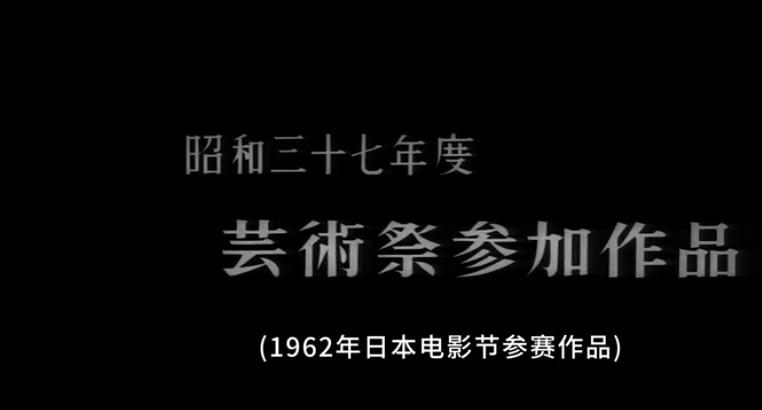When it comes to Japan, the word samurai is inseparable. If the representative of Chinese culture is Confucianism, then the representative of Japanese culture is Bushido. Whether it is destroyed or praised, the spirit of Bushido really runs through the ideology of the Japanese nation. The main requirements of Bushido are: righteousness, courage, benevolence, courtesy, sincerity, honor, and loyalty. The samurai we are familiar with are all frank, lifeless, martial arts, swords that do not leave their hands, and do not seek money and fame.

《Harassing》
Therefore, when director Masaki Kobayashi's famous 1962 film "Cut belly" began to tell us about a samurai named Chichii iwa who tried to "deceive" Izuku of committing suicide by cutting his abdomen in front of Thei house, I am afraid that everyone will think that this samurai has deviated from the spirit of Bushido like me. Especially when he had to commit suicide by self-defeating, he begged for a few days to slow down, and finally found that the knife he carried with him to cut his abdomen was actually a deceptive bamboo knife!
Just by looking at this, no one would sympathize with this samurai. On the contrary, people will only spurn him, and will put a large number of hats on his head for hypocrisy, incompetence, beggars, and so on.
Masaki Kobayashi is a famous director. "Cut belly" dug us such a big hole at the beginning. Later, as Tsubaki Hanshiro, played by Tatsuya Nakayo, unhurriedly tells us a sensational story of "My today is your tomorrow", we are extremely surprised to find that Bushido can be like this.
Tsuyon Hanshiro
In fact, Sensen-iwa is the son-in-law of Tsuyun Hanshiro. However, both warriors were downcasts. Chichiiwa watched as his wife, Miho Tsuyun, and son, Chichiyo, became seriously ill and were forced to sell all their meager possessions, including swords that symbolized the noble honor of the samurai, and to use bamboo swords in their sheaths in front of people. But it was still not enough, and in desperation, he thought of the ruling JingYi family in exchange for a little living money by cutting off their abdomen, but he did not want to be forced to die by the brutal Jingyi family's courtiers.
At the age of more than fifty years, the distraught Tsuyun Hanshiro, with full of grief and indignation, indicted the hypocrisy and cruelty of the samurai system, and even rose up to become an assassin, smashing the altar of the Ini family, and completely changing the tone of the whole story.
This movie has been hailed by many people as a generation of classics, and it is not a waste of time. Here, I don't want to judge from the professional point of view of the film — that's something that countless people have done before. I just want to talk about how I feel and how shock I get.
My biggest shock was that the samurai were like this! Bushido is not all about killing people without blinking, and cutting the abdomen also shouts long live. On the contrary, I saw another side in Tsuyun Hanshiro and Sensen-iwa---gentleness and kindness, but also benevolence, righteousness, and wisdom. The shot of a thousand rocks begging a woman to write under a cherry blossom tree is really beautiful to the extreme, warm to the extreme. It's hard to imagine that this warm-hearted man is a true samurai. I think that at that time, Master Liang Qichao, whom I greatly admired, also wrote a book called "The Way of the Chinese Samurai" to praise this kind of real samurai. As for me, it goes without saying that I have unabashedly expressed my heartfelt admiration for this true samurai. With the samurai spirit always present, the Japanese nation will not decline.
Qian Qianyan begged for a woman
I am not a Member of the Ha-Ri ethnic group, but for the Japanese nation, there are indeed many things worthy of our admiration in terms of the nation's grievances beyond the country's grievances. Economically, there are famous directors such as Akira Kurosawa and Masaki Kobayashi in the film, Seiji Ozawa in music, celebrities such as the Dragon Realm of Wasagawa, Natsuki Soseki, Yasunari Kawabata, etc. in literature, and there are many Nobel Prize winners in science - this nation should not be underestimated. And what makes this nation prosperous? There are many reasons, but here I will only say that the spirit of Bushido is indispensable. With a true samurai like Tsuyun Hanshiro, what reason is there for this nation not to prosper?
Abdominal cut shot
Compared with our other neighbor, South Korea, I believe that the character of the Japanese nation—deep, wise, diligent, and hard-working—goes far beyond the korean national character. Watching China's anti-Japanese films, you can often see some very talented devils, who know Chinese culture well, can also play the piano, write poetry, and know how to respect opponents on the battlefield, often paying tribute to Chinese soldiers who died heroically - this is undoubtedly a bushido legacy. The spirit of Bushido, combined with the Confucian tradition, can this nation not be strong?
Writing this, I am afraid that some people will say that I am blind to the Japanese. I don't have that in mind. Here I just want to calmly analyze the issue of national character, and as for the specific struggle for national interests, I will undoubtedly side with China.
Finally, I would like to thank director Masaki Kobayashi again, as well as the writers and cinematographers, for your dedication and hard work, for bringing us such a shocking masterpiece!